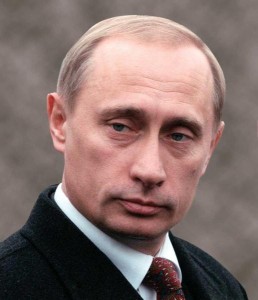 With Vladimir Putin’s re-election for a six year term, and with him talking of helping himself to second-six year term after that, it is a good time to take stock of what Masha Gessen calls the “criminal tyranny” he has established in Russia. Gessen, the author of a an important new book about Putin published this week, is a top Russian journalist who covered Putin’s rise and his consolidation of power for leading newspapers and magazines.
With Vladimir Putin’s re-election for a six year term, and with him talking of helping himself to second-six year term after that, it is a good time to take stock of what Masha Gessen calls the “criminal tyranny” he has established in Russia. Gessen, the author of a an important new book about Putin published this week, is a top Russian journalist who covered Putin’s rise and his consolidation of power for leading newspapers and magazines.
Among the muckraking accounts of Putin and Putin’s regime–works that include Steven Levine’s Putin’s Labyrinth, Edward Lucas’s New Cold War, Laure Mandeville’s La Reconquete Russe, and Anna Politkovskaya’s oeuvre–Gessen’s The Man Without a Face: The Unlikely Rise of Vladimir Putin is easily the best and most authoritative. Much of what she goes over is by now familiar ground: the Moscow apartment bombings, the Kursk submarine disaster, the Nordost and Beslan hostage tragedies, the hounding of politically powerful tycoons like Vladimir Gusinsky and Mikhail Khodorkovsky, and the assassinations of her friend Galina Starovoitova, her journalistic rival Politkovska and of Alexander Litvonenko. But she musters the best and latest evidence in considering those incidents and renders judgement with cool detachment.
Her conclusion in a nutshell is the Putin is not merely a self-described thug and mafioso and the manager of a wildly corrupt kleptocracy, but a murderer too.
“The simple and evident truth is that Putin’s Russia is a country where political rivals and vocal critics are often killed, and at least sometimes the order comes directly from the president’s office.” Generally, as she put it this week on NPR’s Fresh Air, “Putin has created a system of government in which those who fall afoul of the government lose the protection of the law.” In the particular case of Alexander Litvinko, who was investigating the Moscow bombings and died of polonium-210 poisoning in London, she considers it clear beyond reasonable doubt that “Putin ordered [him] dead.”
Gessen has been criticized in some reviews for reaching such conclusions without absolute proof. I do not share that view. In the real world, we have to form political attitudes and make political judgements in real time, without ever knowing everything we would like to know. If a pattern of evidence overwhelmingly indicates something is the case, “beyond reasonable doubt,” we must presume that to be true, even though scientific proof may be lacking (as every prosecutor reminds the jury in every trial).
Gessen is particularly strong on Putin’s seemingly anomalous St. Petersburg years, when the KGB veteran was working in the city government of the supposed reformer, Mayor Anatoly Sobchak. These were the years in which Putin made most of his close political associations, and which paved his path to power. Gessen suggests that Putin was a KGB plant and that Sobchak accepted that, knowing “it was wiser to pick your KGB handler yourself than to have one picked for you.” She says that the two were closer than previous accounts have indicated, and that during the attempted coup against Gorbachev, they played both sides of the fence until the outcome was clear. Thus, there was nothing surprising about Putin’s unswerving loyalty to Sobchak, or his spiriting Sobchak out of the country when the former mayor was in serious trouble with the law–a maneuver that made such a positive impression on Yeltsin and almost certainly accounts for Putin’s elevation to the presidency.
Gessen believes that Putin already was deeply involved in questionable business transactions during the St. Petersburg years, activities that could have got him in serious trouble with the law as well if disclosed. Looking at Putin’s behavior in general terms, she finds indications of a condition called pleonexia, which she describes as the insatiable desire to have what rightfully belongs to others.
Looking to the future, Gessen is torn between resignation and hopefulness. With the eruption of street protests, she sees Putin as vulnerable because his whole system of government depends so exclusively on him personally. But that may be wishful thinking. Putin has played too many dirty tricks and made too many serious enemies to retire voluntarily.
My only serious disagreement with Gessen concerns her characterization of Putin’s political order as “the transformation of Russia back into the USSR”–her final sentence. Even during its final “years of stagnation,” when a corrupt party oligarchy bent on self-perpetuation governed the country, the USSR did not hand over its biggest assets to a small group of greedy entrepreneurs. The government continued to give more than just lip service to principles of social protection and equality. Dissidents were harassed but they were not declared to be outside the law, to be gunned down at will. Putin’s Russia, with more personal liberty but less justice and fraternity, is something quite different–better in some obvious ways, but worse in others, and perhaps more dangerous.